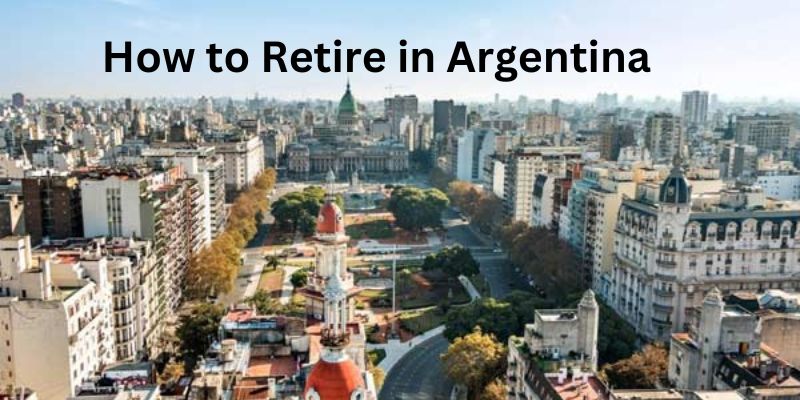How to Retire in Argentina
Nov 08, 2023 By Susan Kelly
Are you interested in retiring to a foreign country? Do you want to live in an exotic location where the climate is warm, and the culture is rich? If so, Argentina might be the perfect destination for your retirement. With its stunning beaches, vibrant cities, and delicious cuisine, it's no surprise that many foreigners have decided to make this South American nation their home when they retire.
In this blog post, we'll take a look at everything that goes into making a move to Argentina – from visas and paperwork to finding housing and navigating finances overseas – plus some of our top tips on how best to enjoy an Argentinean life once you've made yourself at home there. So read on and get started planning your retirement in Argentina today!
Cost of Living and Housing
Retiring in Argentina can be a great option for those keen to explore a different culture and lifestyle, but it's important to consider the cost of living before committing to the move. Generally speaking, Argentina is affordable for retirees, with some basic services costing less than in other countries. For example, groceries tend to be around 30% lower than you would pay in Canada or the United States.
When it comes to housing costs, there are a few factors that will affect your decision-making process. If you're looking for an apartment or house close to city centers like Buenos Aires or Rosario, these areas may have higher rental prices compared to more rural parts of the country.
But if you're willing to look further afield, you can find great deals on rentals in smaller towns and villages. Additionally, it’s worth noting that many landlords do not require a security deposit or credit check and may even offer discounts for long-term leases.
Retire in Argentina – Taxes
Taxes are a key consideration for anyone looking to retire in Argentina. Fortunately, the country offers some beneficial tax laws for foreign retirees.
The main tax obligation applies to expats and foreign nationals is income tax. This covers both domestic and international sources of income. The current rate is 15%, but certain deductions are available for those who qualify as ‘non-residents,’ such as pensioners or students. Additionally, all taxes paid abroad can be deducted from your domestic taxes in Argentina, meaning you could considerably reduce your overall tax burden if you have already paid taxes in other countries.
In addition to income tax, those retiring in Argentina may be liable for wealth taxes depending on the value of their assets. The current rate is 2% for assets between $1,000 and USD 3 million and 3% for those whose assets exceed this amount.
Retire in Argentina – Visas
Retiring in Argentina can be made easier and more accessible by obtaining the correct visa. Two types of visas are available to retirees: a permanent resident’s visa or a temporary retirement visa.
The permanent resident’s visa is relatively straightforward to obtain as long as you meet the criteria for residency, such as having proof of income or an adequate pension. This visa allows you to stay in the country indefinitely and access certain social benefits, such as healthcare and education.
If you do not want to commit to living in Argentina permanently, then you can apply for a temporary retirement visa. To qualify for this type of visa, you must prove that your visit is solely for leisure purposes, provide evidence of a financial ability to support yourself and your family and demonstrate that you intend to return to your home country. This visa usually lasts one year but can be extended if needed.
Once you have obtained the correct visa, you can explore all Argentina offers without worrying about legal issues or restrictions. And with its stunning landscapes, diverse culture, and friendly locals, it’s no wonder why so many people choose Argentina as their retirement destination.
Retire in Argentina – Healthcare
Healthcare is an important consideration for anyone retiring in Argentina, and fortunately, the country offers a comprehensive system suitable for ex-pats. The national healthcare system is Obra Social de Salud (OSDE), which covers many basic medical needs for those living in Argentina. However, OSDE may not cover certain treatments, which will need to be considered when budgeting for your expenses.
Private health insurance is also widely available in Argentina, offering more comprehensive coverage than the public option. Private insurance policies usually include additional benefits such as dental care and prescription medication coverage, but these can come at a cost. It’s worth noting that premiums can vary significantly depending on your age and existing medical conditions, so it’s important to shop around and compare policies before deciding on an option.
For those retiring in Argentina, it is also worth considering supplemental medical insurance for emergencies and treatments that OSDE or private plans may not cover. This can provide peace of mind should you ever need to access more expensive treatments or care overseas.
Tips to Make Your Retirement Savings Last
1. Create and stick to a budget – A budget is essential to ensure your money stretches as far as possible.
2. Invest in high-yield investments – Consider investing some of your retirement savings in higher-risk, higher-return investments such as stocks, bonds, or mutual funds to boost your returns.
3. Downsize and cut expenses where possible – Downsizing to a smaller home or cutting out unnecessary expenses can help you save more money in the long run.
4. Take advantage of tax breaks – Consider ways to reduce taxes by taking advantage of deductions and credits available to retirees, such as income averaging or capital gains exemptions.
5. Delay Social Security – Claiming your Social Security benefits later can mean larger monthly payments when you start receiving them.
6. Plan for long-term care costs – Long-term care is expensive, so it’s important to consider how you will cover these costs in the future.
7. Consider an annuity – An annuity can provide a steady income stream in retirement and help protect against the risks of outliving your savings.
8. Educate yourself on financial topics – Learning about personal finance topics such as investing, tax planning, and estate planning can ensure you make smart decisions with your money.
9. Take advantage of free financial advice – Professional financial advisors can help retirees make informed decisions and maximize their retirement savings.
FAQs
How do I get permanent residency in Argentina?
To obtain permanent residency in Argentina, you must meet certain criteria, such as having proof of income or an adequate pension. You will also need to submit the correct paperwork and application forms.
What are the tax requirements for retirees in Argentina?
Foreign retirees in Argentina must pay income tax on domestic and international sources of income. The current rate is set at 15%, though deductions may be available for non-residents. Wealth taxes may also apply depending on the value of your assets.
Do I need private health insurance if I am retiring in Argentina?
The public healthcare system (Obra Social de Salud) covers basic medical needs for those living in Argentina. However, some treatments may not be included in this coverage. It is worth considering private health insurance for more comprehensive coverage.
Conclusion
Retiring in Argentina can be a great way to experience a new culture, enjoy the warm climate, and reap the benefits of a lower cost of living. By taking care of visas, managing finances, and researching healthcare options beforehand, you can ensure your retirement is stress-free and enjoyable. With its stunning beaches, vibrant cities, and delicious cuisine – it’s no wonder why so many people choose Argentina as their retirement destination!





